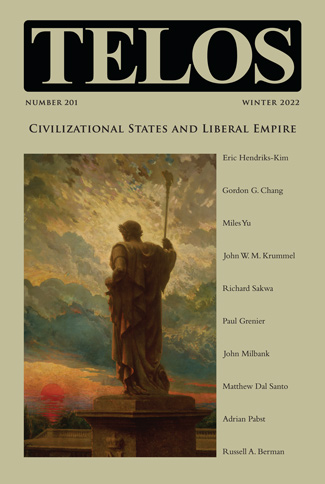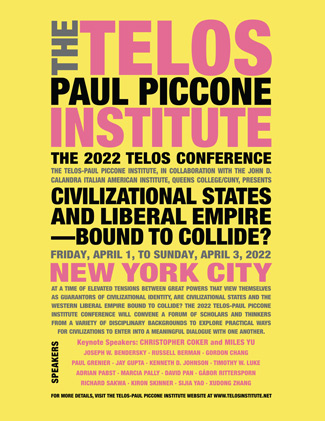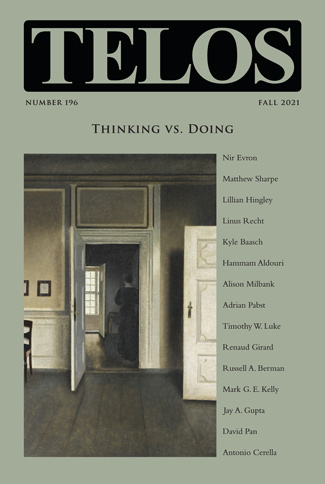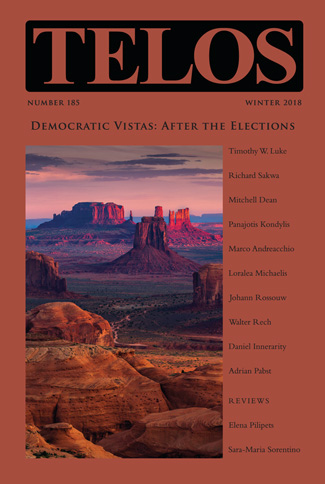By David Pan · Monday, January 16, 2023 Telos 201 (Winter 2022): Civilizational States and Liberal Empire is now available for purchase in our store. Individual subscriptions to Telos are also available in both print and online formats.
 In concluding that “All political action has then in itself a directedness towards knowledge of the good: of the good life, or of the good society,” Leo Strauss describes an essential link between power and values. Because the power to make decisions about our future cannot be separated from the fundamental goals and ultimate meaning of our lives, we cannot exercise power that would be divorced from some set of values. Even the narrowest understanding of self-interest must come to terms with one’s own mortality and the meaning of others for our own existence. Consequently, raw power does not exist, as it can only be exercised within some understanding of its purposes. In concluding that “All political action has then in itself a directedness towards knowledge of the good: of the good life, or of the good society,” Leo Strauss describes an essential link between power and values. Because the power to make decisions about our future cannot be separated from the fundamental goals and ultimate meaning of our lives, we cannot exercise power that would be divorced from some set of values. Even the narrowest understanding of self-interest must come to terms with one’s own mortality and the meaning of others for our own existence. Consequently, raw power does not exist, as it can only be exercised within some understanding of its purposes.
When we consider the way in which power functions on a global level, it will also be crucial to understand how a world order will reflect a particular way of structuring the relationship between values and power. Even the seemingly most egregious use of power can only take place within the framework of an attempt to realize values in the world, and realist accounts of global order must also recognize the importance of some ideology such as nationalism as a means of establishing political values. Accordingly, discussions of balance-of-power dynamics can only begin once great powers emerge as a consequence of the political will of certain peoples to understand themselves in a certain way. Based on such measures as GDP, population, and military spending, Russia does not rank particularly well in relation to countries such as Brazil and India, neither of which pretends to great power status. If Russia can be considered a great power today, it is primarily because of the goals and values that its government embodies. Values form the foundations of global order, and Russia only continues to project its power because it maintains a sense of the global reach of its values for determining order for others.
Continue reading →
By Telos Press · Thursday, May 12, 2022 Writing at the National Interest, Alex Hu reports on the recent 2022 Telos Conference, entitled “Civilizational States and Liberal Empire—Bound to Collide?” An excerpt from the article:
 How do obscure ideas from the ivory tower enter the halls of power? In 2019, London School of Economics professor Christopher Coker published a book on “civilizational states,” describing a new ideological threat to the world order emerging from Russia and China. Three years later, on April 1-3, 2022, four policy advisors to Secretary of State Mike Pompeo spoke at a conference in New York City on the theme of “Civilizational States and Liberal Empire—Bound to Collide?” How do obscure ideas from the ivory tower enter the halls of power? In 2019, London School of Economics professor Christopher Coker published a book on “civilizational states,” describing a new ideological threat to the world order emerging from Russia and China. Three years later, on April 1-3, 2022, four policy advisors to Secretary of State Mike Pompeo spoke at a conference in New York City on the theme of “Civilizational States and Liberal Empire—Bound to Collide?”
Convened by Telos, a quarterly journal—oddly enough—for “critical theory of the contemporary,” the conference attracted a crowd of around thirty academics and intellectual oddballs. Not much consensus was reached. The Pompeo officials themselves disagreed. But their very participation at the event confirms that Coker’s ideas have caught on in a big way.
Continue reading →
By David Pan · Monday, September 20, 2021 Telos 196 (Fall 2021): Thinking vs. Doing is now available for purchase in our store. Individual subscriptions to Telos are also available in both print and online formats.
 The dichotomy of thinking versus doing seems to arise out of our own sense of the difference between our minds and our bodies. On the one hand, the gap between mind and body is the basis of the perspective with which the mind can step back, criticize, and improve the world. Without this gap, we would be trapped in an eternal present, unable to imagine anything but what currently exists. On the other hand, the dichotomy can lead to a sense of detachment from the world. Such detachment can be negative if it leads to an isolation from the world, or to a sense of alienation if the world is such that its influence on the body becomes oppressive for the mind. The opposition between thinking and doing directs our attention toward this fundamental gap between the mind and the body within the human condition that is the source of both all human achievement as well as human debasement. As we focus on thinking, our detachment from our actions can allow us to make judgments about the wisdom of our actions, but such detachment can also lead us to bury ourselves in contemplation and ignore our responsibilities for acting, or even allow us to act with a kind of cruel coldness in trying to realize an abstract idea. This issue of Telos considers such different possibilities for the way in which we relate our thinking to our actions. The dichotomy of thinking versus doing seems to arise out of our own sense of the difference between our minds and our bodies. On the one hand, the gap between mind and body is the basis of the perspective with which the mind can step back, criticize, and improve the world. Without this gap, we would be trapped in an eternal present, unable to imagine anything but what currently exists. On the other hand, the dichotomy can lead to a sense of detachment from the world. Such detachment can be negative if it leads to an isolation from the world, or to a sense of alienation if the world is such that its influence on the body becomes oppressive for the mind. The opposition between thinking and doing directs our attention toward this fundamental gap between the mind and the body within the human condition that is the source of both all human achievement as well as human debasement. As we focus on thinking, our detachment from our actions can allow us to make judgments about the wisdom of our actions, but such detachment can also lead us to bury ourselves in contemplation and ignore our responsibilities for acting, or even allow us to act with a kind of cruel coldness in trying to realize an abstract idea. This issue of Telos considers such different possibilities for the way in which we relate our thinking to our actions.
Continue reading →
By Telos Press · Saturday, September 11, 2021 Telos Zoom Discussion
September 18, 2021
4 pm to 6 pm U.S. Eastern time
Join Telos editors Mark Kelly, Tim Luke, Adrian Pabst, Marcia Pally, David Pan, and David Westbrook for a discussion of the causes of the U.S. failure in Afghanistan and the long-term consequences.
To attend, register here:
https://uci.zoom.us/meeting/register/tJMpf-ivqjMrEtVVTMSia1pfo_L9E2H-bwwk
We look forward to seeing you there.
Continue reading →
By Russell A. Berman · Wednesday, December 12, 2018 Telos 185 (Winter 2018) is now available for purchase in our store. Individual subscriptions to Telos are also available in both print and online formats.
 Recall the 2016 campaign and even more the aftermath of the Trump victory: otherwise reasonable people rushed into heated rhetoric regarding the imminence of dictatorship and the end of democracy as we know it. Comparisons of the America of 2016 and Germany of 1933 proliferated, while denunciations of Republicans as Nazis or Nazi collaborators became common. It would be a worthwhile project for a student or scholar of American culture to cull through those statements and confront their authors with them today: if they were so wrong in 2016, what value is their judgment today, moving forward? Recall the 2016 campaign and even more the aftermath of the Trump victory: otherwise reasonable people rushed into heated rhetoric regarding the imminence of dictatorship and the end of democracy as we know it. Comparisons of the America of 2016 and Germany of 1933 proliferated, while denunciations of Republicans as Nazis or Nazi collaborators became common. It would be a worthwhile project for a student or scholar of American culture to cull through those statements and confront their authors with them today: if they were so wrong in 2016, what value is their judgment today, moving forward?
For those predictions were simply and utterly wrong. Of course, the Republican in the White House and the Republican-controlled Congress pursued a version of a conservative agenda (although not always with success, as in the case of health care). But the rule of law prevailed, courts could decide against the government, the liberal part of the press has been articulate in its critique of administration policies, and, in a quite normal and proper manner, the midterm elections took place. American institutions have proven much more robust than the hysterics of little faith claimed in 2016. Those prophets of dictatorship owe us an accounting—or actually an apology—for their hyperbole. They significantly trivialized what really happened under the Nazi dictatorship, and they cavalierly slandered that slightly less than half of the American electorate that voted for Trump. Time for some critical self-reflection? This is not at all a suggestion that they must endorse the president, but it is way past time for them to concede that his supporters are not a priori Nazis, no matter how much juvenile fun name-calling affords.
Continue reading →
By Telos Press · Wednesday, November 12, 2014 Speaking at the 2014 Telos in Europe Conference, Neil Turnbull considers the prospects for the European project as we move from the Westphalian age of nation-states to a new age of empires. What kind of empire is now emerging in Europe, and what form will it take in the future?
Continue reading →
|
|
 In concluding that “All political action has then in itself a directedness towards knowledge of the good: of the good life, or of the good society,” Leo Strauss describes an essential link between power and values. Because the power to make decisions about our future cannot be separated from the fundamental goals and ultimate meaning of our lives, we cannot exercise power that would be divorced from some set of values. Even the narrowest understanding of self-interest must come to terms with one’s own mortality and the meaning of others for our own existence. Consequently, raw power does not exist, as it can only be exercised within some understanding of its purposes.
In concluding that “All political action has then in itself a directedness towards knowledge of the good: of the good life, or of the good society,” Leo Strauss describes an essential link between power and values. Because the power to make decisions about our future cannot be separated from the fundamental goals and ultimate meaning of our lives, we cannot exercise power that would be divorced from some set of values. Even the narrowest understanding of self-interest must come to terms with one’s own mortality and the meaning of others for our own existence. Consequently, raw power does not exist, as it can only be exercised within some understanding of its purposes. 




